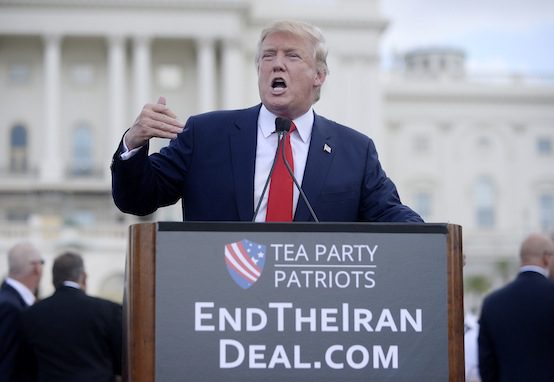Trump’s Irrational Hostility to the Nuclear Deal

Sina Azodi considers the implications of U.S. withdrawal from the nuclear deal:
In the absence of alternatives, and Iran’s flat-out refusal to renegotiate the JCPOA, it is simply illogical to withdraw from a deal that’s working. The collapse of JCPOA may be a minuscule tactical victory for Trump, but it will pave the way for a dangerous crisis in the Middle East, which could even lead to a regional military conflict.
If we judge the nuclear deal on the merits, reneging on it makes no sense as far as U.S. interests are concerned. If the U.S. wants to ensure that Iran’s nuclear program remains a peaceful one, there is no better way of doing this than remaining in a deal that has done exactly what is was supposed to do. Reneging on one of the most successful diplomatic agreements the U.S. has made in decades is a short-sighted and needlessly destructive action, and it will go down as one of Trump’s biggest unforced errors as president. It will make him an international laughingstock, and it will be a huge blow to future U.S. diplomatic efforts for years to come. If that’s the case, why would any self-interested political leader do something so obviously harmful?
Trump doesn’t know and doesn’t care about the merits of the deal, and he is judging it in an entirely different way. Trump’s obvious determination to scrap the deal has always been based on two things: his desire to repudiate anything that could be considered part of Obama’s legacy, and his reflexive hostility to Iran. Because Trump has a zero-sum view of all agreements between states, whether they concern trade or nonproliferation or arms control, once he concluded that the deal must be the “worst” because it was negotiated by Obama that must mean that it is the “best” deal for Iran. If he kept the deal as it is, that would mean that Obama was ultimately right about how to handle the nuclear issue and Trump was wrong, and he doesn’t want to admit this and may not even be capable of admitting it. Trump would rather inflict unnecessary damage on U.S. interests than concede that Obama secured a reasonably good deal for the U.S., and as long as he can score points with his own supporters by doing this that seems to be all that matters to him.
Since Trump doesn’t understand any of the relevant issues and thinks about these things only in crude terms of winning and losing, he wants to renege on the JCPOA despite its obvious benefits because for us because he can’t imagine an agreement that benefits more than one side. If Iran gets anything out of the deal (sanctions relief, for example), the U.S. must have been ripped off. This is why Trump is drawn to maximalist demands and the hard-liners that make them. He doesn’t favor reaching a compromise with other governments on these issues because he doesn’t think a mutually beneficial compromise is possible, and the hard-liners that he surrounds himself with don’t believe that compromise with adversaries is desirable. That is why they loathe a successful compromise such as the JCPOA and want to abandon it, and it is also why they have no interest in anything less than North Korea’s capitulation.
Comments